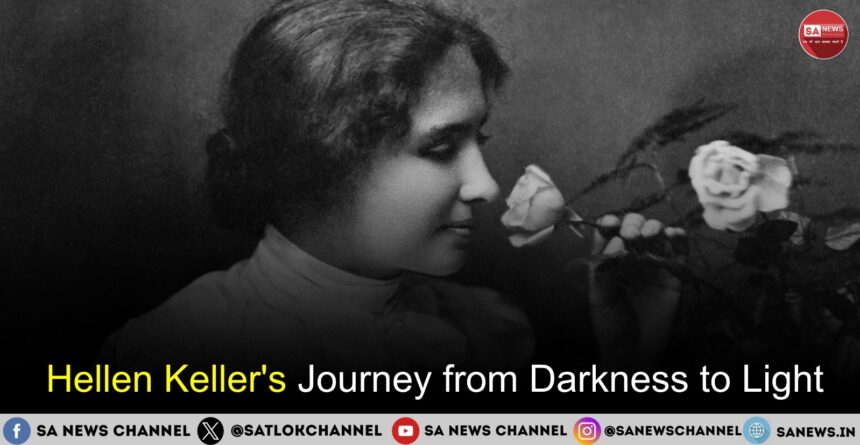Helen Keller’s life shows how strong the human spirit can be. Born with sight and hearing, she lost both at a young age. This plunged her into a world of darkness and silence.
- Key Takeaways
- The Early Life of Helen Keller
- Living in a World of Silence and Darkness
- The Arrival of Anne Sullivan
- Sullivan’s Background and Preparation
- First Meetings and Establishing Trust
- The Breakthrough at the Water Pump
- Learning to Communicate with the World
- Formal Education Journey
- Helen Keller’s Literary Accomplishments
- Advocacy and Social Activism
- Championing Rights for People with Disabilities
- Women’s Suffrage Support
- Political Views and Controversies
- Global Impact and Connection to India
- International Speaking Tours and Influence
- Helen Keller’s Legacy in Indian Disability Rights Movement
- Relationships That Shaped Helen Keller’s Life
- Legacy and Influence in Modern Times
- Conclusion: The Enduring Inspiration of Helen Keller
- FAQ
- What was Helen Keller’s condition at birth?
- Who was Anne Sullivan, and what was her role in Helen Keller’s life?
- How did Helen Keller learn to communicate?
- What was the breakthrough moment in Helen Keller’s learning process?
- What were some of Helen Keller’s notable literary achievements?
- What causes did Helen Keller advocate for?
- What is the Helen Keller International organization, and what does it do?
- How is Helen Keller’s legacy represented in modern times?
- What was Helen Keller’s educational journey like?
- How did Helen Keller’s story impact the disability rights movement in India?
Despite these challenges, Keller never gave up. Her determination and resilience helped her break through her deaf-blindness. She learned to communicate and became a global inspirational figure.
Her journey teaches us that with courage and the right support, we can overcome any obstacle.
Key Takeaways
- Helen Keller’s story is a powerful example of overcoming adversity.
- Despite being deaf-blind, she learned to communicate and read.
- Her determination and resilience made her a global inspirational figure.
- Keller’s journey highlights the importance of support and courage.
- Her legacy continues to inspire people worldwide.
The Early Life of Helen Keller
Helen Keller was born on June 27, 1880, in Tuscumbia, Alabama. Her early life was normal until a sudden illness changed everything. Her family background played a big role in shaping her early years.
Birth and Family Background
Helen Keller was born to Captain Arthur Keller and Kate Adams Keller. Her father was a Civil War veteran and came from a Swiss-German family. Her family’s history and values had a lasting impact on her upbringing.
Alabama Childhood and Family Influences
Growing up in Alabama, Helen Keller was surrounded by her loving family. This included her parents and siblings. The family’s close-knit nature provided a nurturing environment.
The Illness That Changed Everything
At 19 months, Helen Keller contracted a fever that left her deaf and blind. This pivotal event in her life had far-reaching consequences.
The Mysterious Fever at 19 Months
The exact nature of the illness remains unknown. But its impact on Helen Keller’s life was profound. It led to her losing her sight and hearing.
Immediate Aftermath and Family Response
Helen Keller’s family struggled to cope with her new condition. They sought various treatments, but it was clear that her life would never be the same. The family’s response to her condition laid the groundwork for her future.
Living in a World of Silence and Darkness
Helen Keller faced huge obstacles from a young age because she was deaf-blind. In the 19th century, people didn’t really understand her condition.
The Challenges of Deaf-Blindness in the 19th Century
Back then, doctors didn’t know much about deaf-blindness. They didn’t have good treatments, and some were even harmful.
Medical Understanding of the Time
In the 1800s, doctors didn’t get deaf-blindness. Their treatments didn’t work well and sometimes hurt people.
Social Attitudes Toward Disabilities
People with disabilities were treated poorly back then. They were often left out of society.
“The greatest thing in the world is not so much where we stand, as in what direction we are moving.” – Oliver Wendell Holmes
Early Communication Attempts and Frustrations
Helen Keller had a hard time talking early on. She used home signs to talk to her family.
Developing Home Signs
Home signs are special gestures for family use. Helen Keller made her own signs to get her needs across.
Growing Behavioral Challenges
As Helen got older, she got more frustrated. She would sometimes get violent or break things.
| Challenge | Description | Impact on Helen Keller |
| Medical Understanding | Limited knowledge of deaf-blindness | Ineffective treatments |
| Social Attitudes | Marginalization and exclusion | Social isolation |
| Communication Attempts | Frustration and behavioral challenges | Difficulty expressing needs |
Helen Keller’s struggles were huge, but they also helped her start an amazing journey. She learned to communicate and get an education.
The Arrival of Anne Sullivan
The meeting of Helen Keller and Anne Sullivan was a historic moment. It changed Helen’s life forever. Anne Sullivan, a 20-year-old graduate of the Perkins School for the Blind, arrived at the Keller household in 1887. She was ready to teach Helen.
Also Read: Larry Page: The Visionary Mind That Built Google and Transformed the Digital World
Sullivan’s Background and Preparation
Anne Sullivan had her own struggles with visual impairment. She lost much of her sight due to trachoma. She went through surgeries and learned to read and write in braille at the Perkins School.
Her Own Visual Impairment Experience
Sullivan’s personal struggles with visual impairment helped her understand Helen’s challenges. This allowed her to connect with Helen on a deeper level.
First Meetings and Establishing Trust
The first interactions between Helen and Anne were tough. Helen was frustrated with others trying to communicate with her. But Sullivan’s patience and innovative methods eventually won her trust.
Initial Resistance and Breakthrough Moments
Helen’s resistance turned to curiosity as Sullivan taught her the manual alphabet. She spelled words into Helen’s hands. The breakthrough came when Helen understood the connection between words and objects.
The Breakthrough at the Water Pump
The key moment was at the water pump outside Helen’s house. Sullivan spelled “water” into Helen’s hand while water flowed over it. Helen suddenly grasped the connection between the word and the sensation.
Understanding the Connection Between Words and Objects
This moment marked the start of Helen’s rapid learning. She began to understand that everything had a name. She could communicate through language.
The breakthrough at the water pump was a communication breakthrough for Helen. It changed her life, letting her connect with the world. Anne Sullivan’s dedication and innovative teaching methods unlocked Helen’s full potentials, paving the way for her future achievements.
- Anne Sullivan’s background and experience played a key role in teaching Helen.
- The trust between Helen and Anne was essential for their successful communication.
- The breakthrough at the water pump was a turning point in Helen’s education.
Learning to Communicate with the World
With Anne Sullivan’s help, Helen Keller learned to connect with the world. She used different ways to communicate.
Mastering the Manual Alphabet
Helen Keller’s first big step was the manual alphabet. It’s a way to spell words into your hand. This was key for her to start understanding language.
Tactile Sign Language Development
The manual alphabet helped Helen Keller understand words and sentences. It was a big step towards better communication.
Learning to Read Braille
Helen Keller also learned braille. It’s a system of raised dots that stand for letters and words. This opened a door to lots of books and knowledge.
Access to Literature and Knowledge
Braille let Helen Keller read a lot. She got to know many books and educational materials. This broadened her view of the world.
Developing Speech Skills Against All Odds
Helen Keller also learned to speak, despite being deaf. She used the Tadoma method. This method lets her feel the speaker’s lips and throat to understand speech.
The Tadoma Method and Vocal Training
The Tadoma method and vocal training helped Helen Keller speak well. She could talk to people who could hear, making communication easier.
| Communication Method | Description | Significance |
| Manual Alphabet | Finger spelling into the hand | Initial understanding of language |
| Braille | System of raised dots representing letters and words | Access to literature and knowledge |
| Tadoma Method | Feeling lips and throat to understand speech | Development of speech skills |
“The only thing worse than being blind is having no vision.” – Helen Keller
Helen Keller’s journey to learn to communicate changed her life. It also inspired many others. Her story shows the power of hard work and creative teaching.
Formal Education Journey
Helen Keller’s academic journey was a testament to her strong spirit. She broke barriers in education. Her path included Perkins School for the Blind, Cambridge School for Young Ladies, and Radcliffe College.
Perkins School for the Blind
Helen Keller started at Perkins School for the Blind. There, she learned using special methods. Specialized Education Approaches helped her overcome being deaf-blind.
Specialized Education Approaches
At Perkins, teachers used the manual alphabet to teach Helen. This was key to her learning and growth.
Cambridge School for Young Ladies
Then, Helen went to Cambridge School for Young Ladies. There, she learned with students who were not disabled. This was very important for her.
Integration with Non-Disabled Students
At Cambridge, Helen took part in school activities with other students. This helped her grow both personally and academically.
Radcliffe College Achievement
Helen Keller’s biggest achievement was graduating from Radcliffe College. She was the first deaf-blind person to earn a Bachelor’s degree. This showed her hard work and intelligence.
Becoming the First Deaf-Blind Person to Earn a Bachelor’s Degree
Her graduation was a big win for Helen. It also opened doors for others with disabilities. Her success at Radcliffe College was a major milestone in education history.
Helen Keller’s Literary Accomplishments
Helen Keller’s writings show her strength and willpower. Her stories have touched millions, inspiring them to face challenges.
“The Story of My Life” and Its Global Impact
“The Story of My Life,” Helen Keller’s autobiography, was published in 1903. It quickly became a hit worldwide. This book was more than her story; it was a source of hope for many.
Reception in India and Worldwide
People everywhere loved “The Story of My Life.” In India, her story deeply connected with many. The book has been translated into many languages, reaching even more people.
Other Notable Works and Publications
Helen Keller wrote many books and articles. Some of her famous works are “Optimism” and “The Song of the Stone Wall.”
Themes of Optimism and Perseverance
Helen Keller’s writings often talk about staying positive and never giving up. Her stories encourage readers to keep a hopeful spirit, no matter what.
| Book Title | Year Published | Notable Themes |
| The Story of My Life | 1903 | Overcoming adversity, perseverance |
| Optimism | 1904 | Positive thinking, hope |
| The Song of the Stone Wall | 1910 | Resilience, determination |
Advocacy and Social Activism
Helen Keller was a trailblazer in advocating for people with disabilities and women. Her efforts had a profound impact on social justice. She worked tirelessly for equality and fairness.
Championing Rights for People with Disabilities
Helen Keller fought for the rights of those with disabilities. She believed everyone could make a difference, no matter their abilities.
Founding Organizations and Awareness Campaigns
Keller helped start the American Foundation for the Blind (AFB). She worked hard to show the world what people with disabilities could do. Her work led to better access and more opportunities for the disabled.
Women’s Suffrage Support
Keller also supported women’s right to vote. She knew women’s voices were essential in politics. She joined forces with other suffragists to win women the right to vote.
Fighting for Equal Rights
Keller showed that disability rights and women’s rights are connected. She believed true equality comes from addressing both.
Political Views and Controversies
Keller’s views were ahead of her time. She wasn’t afraid to speak out, even if it meant facing criticism. Her convictions were unwavering.
Standing Firm Despite Public Criticism
Keller faced criticism but never wavered. Her courage and determination in the face of adversity were inspiring.
| Advocacy Area | Key Actions | Impact |
| Disability Rights | Co-founded AFB, raised awareness | Improved accessibility and opportunities |
| Women’s Suffrage | Supported suffrage movements | Contributed to securing voting rights |
| Political Activism | Challenged societal norms | Inspired social change and reform |
Global Impact and Connection to India
Helen Keller’s work reached far beyond her home. She fought for the rights of the disabled and wrote books that touched hearts worldwide. Her efforts made the world a more welcoming place.
International Speaking Tours and Influence
Helen Keller’s travels took her to many countries. She shared her story of overcoming obstacles with people everywhere. Her ability to connect with people from various backgrounds was a testament to her universal appeal.
Visits to India and Reception
In India, Helen Keller was welcomed with open arms. Her story and advocacy for the disabled inspired many. Her presence helped raise awareness about disability rights in the country.
Helen Keller’s Legacy in Indian Disability Rights Movement
Helen Keller’s work continues to shape the disability rights movement in India. Her pioneering efforts have inspired many activists.
Ongoing Influence in Indian Education and Advocacy
Helen Keller’s impact is seen in Indian education and advocacy. Her legacy has helped create more inclusive programs and initiatives for people with disabilities in India.
Relationships That Shaped Helen Keller’s Life
Helen Keller’s life was deeply influenced by the people she met. Her journey shows how important supportive and loving relationships are.
The Lifelong Bond with Anne Sullivan
Anne Sullivan was more than a teacher to Helen Keller. She was a lifelong friend. Sullivan’s unique teaching methods helped Keller understand language.
Evolution from Teacher to Companion
As Keller grew, her bond with Sullivan changed. It moved from teacher to a deep friendship. Sullivan stayed by Keller’s side for life.
Other Significant Relationships and Supporters
Helen Keller had many supporters beyond Anne Sullivan. Family, educators, and public figures helped her. They supported her advocacy work.
Professional Collaborations and Personal Connections
Keller worked with many to help people with disabilities. These partnerships helped her work and enriched her life.
Together, these relationships greatly influenced Helen Keller’s life. They show how human connections can help us overcome challenges.
Legacy and Influence in Modern Times
Helen Keller’s life and work have a lasting impact. They shape how we see disability and education today. Her legacy shows the strength of resilience and determination.
The Helen Keller International Organization
The Helen Keller International organization carries on her mission. It fights blindness and malnutrition worldwide. Founded in 1915, it has become a global leader in health and well-being.
Continuing Work in Vision and Nutrition Worldwide
Helen Keller International tackles big health problems. They focus on vision health and nutrition. Their work has changed many lives around the world.
Representation in Media and Educational Curriculum
Helen Keller’s story is in many media and educational materials. It inspires new generations. Her story in schools worldwide motivates students.
Impact on Disability Representation in India and Globally
Helen Keller’s story has changed how we see disability. In India and other places, it helps us understand disability rights better.
Sharing Helen Keller’s story and legacy helps us build a kinder, more inclusive world. Her influence today shows the power of one person’s impact.
Conclusion: The Enduring Inspiration of Helen Keller
Helen Keller’s life shows us how strong the human spirit can be. Despite being deaf and blind, she learned to communicate and read. Her determination and resilience inspired millions around the world.
Her legacy goes beyond her writing. She fought for rights of people with disabilities and supported women’s suffrage. The Helen Keller International organization carries on her work, pushing for disability rights and empowerment everywhere.
Keller’s story has inspired many for generations. It shows that with the right support and mindset, anyone can reach their goals. Her impact is seen not just in the United States but also in places like India, where she has influenced the disability rights movement.
Thinking about Helen Keller’s journey reminds us of her lasting inspiration. Her life teaches us that challenges can lead to growth. With perseverance, we can make a big difference in the world.
Helen Keller’s life shows how determination can turn darkness into light. Despite losing sight and hearing at 19 months, she overcame every challenge with courage and strong will. Sant Rampal Ji Maharaj explained — that real blindness is not of the eyes but of spiritual ignorance. Just as Helen found light within, a devotee finds true peace only through the guidance of the Satguru.
Sant Rampal Ji Maharaj imparts the True Naam Diksha that removes the darkness of ignorance and connects the soul with the Supreme God Kabir Saheb. Through His divine knowledge, one attains freedom from suffering, illusion, and the cycle of birth and death. Helen Keller’s example teaches us persistence in the physical world; Sant Rampal Ji Maharaj shows the way to Satlok, the eternal world of happiness beyond pain and darkness.
FAQ
What was Helen Keller’s condition at birth?
Helen Keller was not born deaf-blind. She lost her sight and hearing at 19 months due to a high fever.
Who was Anne Sullivan, and what was her role in Helen Keller’s life?
Anne Sullivan was Helen Keller’s teacher and lifelong friend. She helped Helen learn to communicate through touch.
How did Helen Keller learn to communicate?
Helen learned to communicate through touch, braille, and speech. Anne Sullivan and others helped her.
What was the breakthrough moment in Helen Keller’s learning process?
Helen understood the word “water” meant actual water at a pump. This was a key moment in her learning.
What were some of Helen Keller’s notable literary achievements?
Helen wrote several books, including “The Story of My Life.” It became famous worldwide. Her writing showed her optimism and determination.
What causes did Helen Keller advocate for?
Helen Keller fought for disability rights and women’s suffrage. She faced criticism but kept advocating.
What is the Helen Keller International organization, and what does it do?
The Helen Keller International organization carries on her work. It focuses on vision and nutrition worldwide, aiming to prevent blindness and reduce malnutrition.
How is Helen Keller’s legacy represented in modern times?
Helen Keller’s legacy lives on through the Helen Keller International organization. Her story also inspires new generations in education and disability rights.
What was Helen Keller’s educational journey like?
Helen Keller went to Perkins School for the Blind and Cambridge School for Young Ladies. She also attended Radcliffe College, becoming the first deaf-blind person with a bachelor’s degree.
How did Helen Keller’s story impact the disability rights movement in India?
Helen Keller’s visits to India and her writings inspired the disability rights movement there. Her legacy continues to influence education and advocacy.









